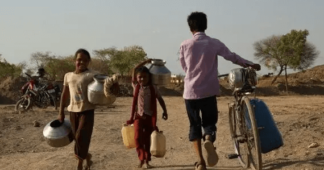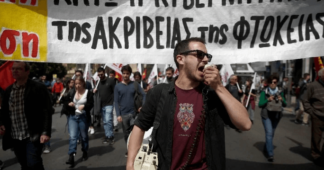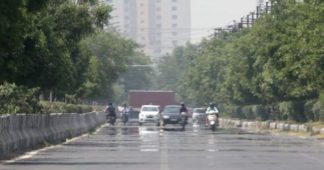“Each week prices are galloping, not just rising. They have already doubled and kept rising,” a fourth-generation farmer explained.
May 10, 2022
The recent massive increases in energy and animal feed prices caused by the Ukraine crisis have put an unbearable burden on livestock farmers across Greece, making their business barely viable.
While tending to his sheep, goats and chicken on the family farm in the village of Kleitoria in southern Greece, livestock breeder Diamantis Zournas is constantly calculating his costs. This fourth-generation farmer has a flock of 350 sheep and goats, as well as chicken, and sells his produce in his butcher shop on the village’s square.
“The situation has become unbearable,” he said, as everything is more expensive. Even a few months ago he still paid 250-300 euros for electricity. The most recent bills were close to 1,000 euros. Transport costs have also increased due to the ever higher fuel prices.
“Each week prices are galloping, not just rising. They have already doubled and kept rising. Corn today costs more than 40 cents a kilo, while we used to buy it for 18-19 cents,” he explained.
According to the Hellenic Livestock Association, the prices of barley, clover, hay, soy and wheat have also doubled in the past few months. Domestic production cannot cover the farmers’ needs. Greece imports around 250,000 tons of animal feed annually from Russia and Ukraine, but the conflict there has created a bottleneck on the export pipelines.
The Black Sea basin is one of the world’s most important areas for agricultural production. The food security impact of the conflict will likely be felt beyond #Ukraine’s border.
Here's more about the conflict's impact on global food security. ▶️⤵️ pic.twitter.com/7X9nzh1ckW
— World Food Programme (@WFP) March 5, 2022
Meanwhile, the costs of production are skyrocketing. “I doubt that livestock breeders who do not produce their own feed will be able to make ends meet. They will be forced to sell their herds. It has already started. It is happening,” Zournas said.
Pavlos Satolias, president of the National Union of Agricultural Cooperatives of Greece (ETHEAS), said that the situation has been difficult, but it “got so much worse due to the Ukrainian conflict. Production costs have risen by approximately 30 percent. This year, the livestock breeders will probably work without making a living, without making any profit.
“We fear that many of us will leave the industry, which would be a catastrophic development. Here in the countryside, people do not have anything else to make a living. Our villages would become deserted,” he said.
The associations consider the subsidies announced by the government inadequate. They call for more generous support measures so that the sector remains sustainable. In absence of adequate support in times of crisis, Zournas fears that many of Kleitoria’s 1,000 residents — who depend on their animals — would leave for the urban centers.
We remind our readers that publication of articles on our site does not mean that we agree with what is written. Our policy is to publish anything which we consider of interest, so as to assist our readers in forming their opinions. Sometimes we even publish articles with which we totally disagree, since we believe it is important for our readers to be informed on as wide a spectrum of views as possible.











